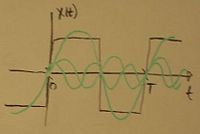Class Notes 1-5-2010: Difference between revisions
Jump to navigation
Jump to search
No edit summary |
No edit summary |
||
| (2 intermediate revisions by one other user not shown) | |||
| Line 12: | Line 12: | ||
The individual component representation of vector <math> \vec{v} </math> in the x-direction. |
|||
:<math>v_\mathrm{x} = \vec{v} \cdot \mathbf{\hat{i}}</math> |
:<math>v_\mathrm{x} = \vec{v} \cdot \mathbf{\hat{i}}</math> |
||
The two-dimensional example of a vector in its components with the vector designations. |
|||
:<math> \vec{v} = v_\mathrm{x} \mathbf{\hat{i}} + v_\mathrm{y} \mathbf{\hat{j}} </math> |
:<math> \vec{v} = v_\mathrm{x} \mathbf{\hat{i}} + v_\mathrm{y} \mathbf{\hat{j}} </math> |
||
This is the summation used to represent the vector <math> \vec{v} </math> as having as many dimensions as needed to express its full value: |
|||
:<math> \vec{v} = \sum_{i} v_\mathrm{i} \mathbf{\hat{a}}_\mathrm{i} </math> |
:<math> \vec{v} = \sum_{i} v_\mathrm{i} \mathbf{\hat{a}}_\mathrm{i} </math> |
||
:<math> \langle v_x, v_y\rangle</math> |
:<math> \langle v_x, v_y\rangle</math> |
||
This is the equation for finding the distance between the two vectors <math> \vec{u} </math> and <math> \vec{v} </math> who are separated by angle <math> \theta </math>. |
|||
:<math> \vec{u} \cdot \vec{v} = |\vec{u}| |\vec{v}| \cos\theta </math> |
:<math> \vec{u} \cdot \vec{v} = |\vec{u}| |\vec{v}| \cos\theta </math> |
||
:<math> \vec{v} \cdot \mathbf{\hat{i}} = v_\mathrm{x} (\mathbf{\hat{i}} \cdot \mathbf{\hat{i}}) + v_\mathrm{y} \mathbf{\hat{j}} \cdot \mathbf{\hat{i}} </math> |
:<math> \vec{v} \cdot \mathbf{\hat{i}} = v_\mathrm{x} (\mathbf{\hat{i}} \cdot \mathbf{\hat{i}}) + v_\mathrm{y} \mathbf{\hat{j}} \cdot \mathbf{\hat{i}} </math> |
||
:<math> \vec{v} \cdot \mathbf{\hat{i}} = v_\mathrm{x} </math> |
:<math> \vec{v} \cdot \mathbf{\hat{i}} = v_\mathrm{x} </math> |
||
:<math> \vec{v} \cdot \mathbf{\hat{a}}_\mathrm{m} = \sum_{i} v_\mathrm{i} \mathbf{\hat{a}}_\mathrm{i} \cdot \mathbf{\hat{a}}_\mathrm{m} = v_\mathrm{m} </math> |
:<math> \vec{v} \cdot \mathbf{\hat{a}}_\mathrm{m} = \sum_{i} v_\mathrm{i} \mathbf{\hat{a}}_\mathrm{i} \cdot \mathbf{\hat{a}}_\mathrm{m} = v_\mathrm{m} </math> |
||
:<math> \delta_\mathrm{i,m} \equiv \begin{cases} 1 & \mbox{if } i = m |
:<math> \delta_\mathrm{i,m} \equiv \begin{cases} 1, & \mbox{if } i = m \\ 0, & \mbox{else} \end{cases}</math> |
||
==Example== |
==Example== |
||
| Line 43: | Line 46: | ||
==Reviewed By== |
==Reviewed By== |
||
*[[Gratias, Ryan|Ryan Gratias]] |
|||
Latest revision as of 12:37, 20 January 2010
This article covers the notes given in class on January 5, 2010.
Subjects Covered
1) Linear Systems
2) Functions as Vectors
The individual component representation of vector in the x-direction.
The two-dimensional example of a vector in its components with the vector designations.
This is the summation used to represent the vector as having as many dimensions as needed to express its full value:
This is the equation for finding the distance between the two vectors and who are separated by angle .
Example
Given function:
1) Use vector analogy
External Links
Authors
Colby Fullerton
Brian Roath
















![{\displaystyle x(t)=\sum _{n=1}^{\infty }\left[b_{n}\sin \left(\left({\frac {2\pi n}{T}}\right)t\right)\right]}](https://wikimedia.org/api/rest_v1/media/math/render/svg/1b15fa18143738e6bbe3d2aefb2cc8a5ac979bb7)
![{\displaystyle x(t)\cdot \sin \left({\frac {2\pi mt}{T}}\right)=\sum _{n=1}^{\infty }\left[b_{n}\sin \left(\left({\frac {2\pi n}{T}}\right)t\right)\cdot \sin \left({\frac {2\pi mt}{T}}\right)\right]}](https://wikimedia.org/api/rest_v1/media/math/render/svg/570a428f69ebcdd14e9a313bceea1472ddbf5f67)
